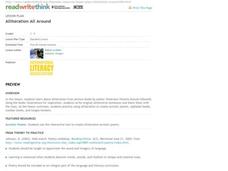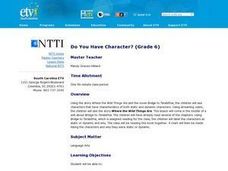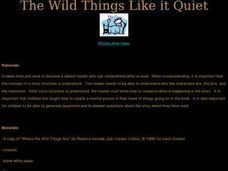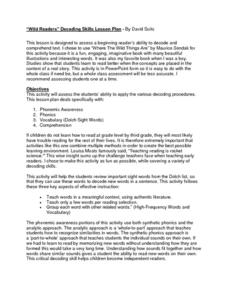Curated OER
Do You Prefer Your Children's Book Characters Obedient or Contrary? Opinion Writing
With this New York Times "Learning Network" exercise, high schoolers read an article about the death of Maurice Sendak, author of Where the Wild Things Are and then respond to several prompts that require them to shape their own opinions...
Curated OER
Chicken Soup With Rice
Complete a variety of activities related to the Maurice Sendak's book Chicken Soup With Rice. Readers identify the months of the year, identify words starting with the letter J, explore online illustrations created by Maurice Sendak, and...
Curated OER
Chicken Soup with Rice Extension Activities
After reading Chicken Soup with Rice, by Maurice Sendak, incorporate some of these great extension activities into your lesson plan. Ideas include focusing on knowing the months of the year, or studying the illustrations and how...
ReadWriteThink
Alliteration All Around
Discover alliteration found in picture books by Pamela Duncan Edwards. Then, dive into a read aloud of Alligators All Around by Maurice Sendak. This practice sets the stage for budding poets to create their own acrostic poem,...
Curated OER
Do You Have Character?
Sixth graders read Katherine Paterson's novel, Bridge to Terabithia, and watch a video of Maurice Sendak's book, Where the Wild Things Are. They examine the characters in both stories that share similar characteristics. Students use the...
Harper Collins
Let the Wild Rumpus Start!
Accompany a reading of the story, Where the Wild Things Are by Maurice Sendak, with an activity booklet featuring five worksheets created to continue to the learning experience. Scholars solve a maze, draw a picture, search for Max,...
Curated OER
The Wild Things Like it Quiet
Young scholars read Where the Wild Things Are by Maurice Sendak. They visualize what is happening in the book and then identify the main points of the story. Students write a summary of the book and draw a picture of what they...
Curated OER
Wild Words
First graders use action spelling. In this high frequency words instructional activity students are read the book Where the Wild Things Are by Maurice Sendak. Students add words to the classroom wall that are in the book. Students act...
Curated OER
It's About the Author
Students develop print awareness. In this literature lesson plan, students memorize and recite nursery rhymes and listen to stories of Maurice Sendak and Ezra Jack Keats. Students draw pictures to illustrate read aloud books and dictate...
Curated OER
Birthday Soup
Students utilize the story, "Chicken Soup With Rice, " by Maurice Sendak to compare the number of days in each month, research their birth date and navigate their way through a calendar.
Curated OER
Monster Voices
Young scholars create stories based upon the techniques of author Maurice Sendak in Where the Wild Things Are. They use a word processing program and the Apple software program GarageBand to create new voices for the...
Curated OER
Writing for Different Purposes and Audiences
Third graders explore how to write for different purposes and for a specific audience or person. They read, Where the Wild Things Are by Maurice Sendak. Students create a class book after reading the story. They each create their own...
Curated OER
Wild Things - Texture And Pattern
Students implement textures and patterns in creating an imaginary Wild Thing, using the book and illustrations in Where the Wild Things Are by Maurice Sendak serve as Inspiration.
Curated OER
Monsters are Make-Believe
Students decide if items are real or make-believe. For this lesson on reality, students listen to the book Where the Wild Things Are by Maurice Sendak and discuss the difference between items that are real and items that are make-believe.
Curated OER
Stepping Stones
Students listen to stories read aloud. They examine a work of art by a known artist. Students take a picture using the digital camera. They listen as the teacher reads "Where the Wild Things Are." Students compare and contrast the...
Curated OER
Writing: Mentor Text Lesson & Microteaching
Mentor texts are a great way to demonstrate how to write with purpose. Pupils will be reintroduced to two well-known books and then asked to think about them from the writer's point of view. They will see that the author had to use basic...
Curated OER
It's All About Expression: Growing Independence and Fluency
In an engaging anticipatory set, the teacher uses several different strategies to activate prior knowledge about reading with expression, including using sentence strips (that must be prepped ahead of time) to show different moods. The...
Curated OER
Wild Things
Students draw a literacy response picture demonstrating knowledge and appropriate use of computer hardware components (monitor, mouse) using KidPix and Kidspiration software with a minimum of two different pictorial details on their...
David Suits
“Wild Readers” Decoding Skills Lesson Plan
Set young readers on the path toward fluency with this phonemic awareness resource. Based on the award-winning children's book, Where the Wild Things Are, this lesson plan allows beginning readers to...
Curated OER
Worksheet 2/7 on Subject
In this identifying subjects in sentences worksheet, students use nouns from a word bank to fill in the blanks with the subjects of the sentences. Students write 6 answers.
Curated OER
Clifford Learns About the Four Seasons and So Do We!
Students explore the seasons and months of the year through literature, math, art and movement. They identify the month of their birthday and in which season it comes. Students name the four seasons and they memorize a poem to recite the...
Curated OER
Texture: Wild Things
Students experiment with different kinds of marking techniques. They read "Where the Wild Things Are" and observe animals for pattern and line. They compare illustrations with Haring's images. They create a symbolic drawing of animal.
Curated OER
Thumbs Up For Expert Readers!
Students use the cross check strategy to increase reading comprehension in this lesson. They listen as the teacher reads "Where the Wild Things Are." The teacher purposely reads some words wrong so that the story does not make sense. ...
Curated OER
Reading Like Wild Animals!
Students read orally a number of times to increase oral reading speed and fluency. The teacher models fluent oral reading, and the students practice on sample sentences. They then read with a partner working to increase their oral...

























